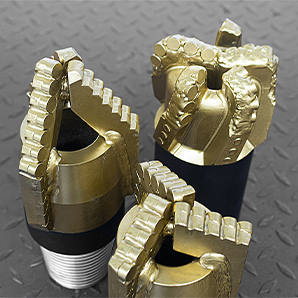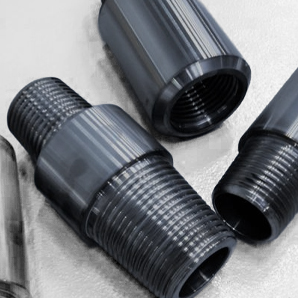General Terms and Conditions
General Terms and Conditions of Business of
European Drilling Center s.r.o
§I - Validity of the terms and conditions
-
These general terms and conditions of business (T & Cs) shall apply for all contracts and agreements made with European Drilling Center s.r.o., hereinafter known as EDC, with regard to goods and services as well as for contract offered and accepted by and from businesses, hereinafter also known as Customers.
When an offer is notified, and no later than when an offer is accepted or when the first goods or services are rendered at the latest, the other party to the contract accepts that only these terms and conditions of business shall apply, also with regard to future business relationships, unless an agreement has been made to the contrary in writing.
-
Every additional contractual agreement as well as assurances, side agreements and amendments to the contract must be confirmed in writing by EDC to be valid.
-
The terms and conditions of purchase of the other party to the contract which differ from EDC?s T & Cs shall only apply if they are expressly confirmed in writing by EDC, even if reference is made to them when an order is placed with EDC. If, by way of exception, EDC agrees that the terms and conditions of purchase of the other party to the contract may apply, EDC?s T & Cs shall also continue to apply in so far as they concern matters not covered in the terms and conditions of purchase of the other party to the contract.
§II - Offers and order confirmations
-
The offers made by EDC shall be subject to change without notice and non-binding in all cases. Orders shall only be regarded as having been accepted once they have been accepted in writing. The prices stated in price lists, catalogues or in advertisements placed by EDC are not binding. Diagrams and information in catalogues and leaflets only apply as approximations unless they have been expressly designated as being binding. EDC shall reserve the right to make modifications to the types, designs or to fittings, provided that the modification to the subject-matter of the contract is not unreasonable for the other party to the contract.
§III - Subject-matter of the contract
-
The scope of our obligations (E.g. goods to be supplied, accessories and spare parts, technical and other documentation, technical familiarisation, problem-solving and use) shall be determined solely by the contents of our order confirmation.
-
Provided that it also seems to us to be the obvious thing to do for technical or for other reasons, we shall also be entitled to modify designs of the contractual goods even after we have entered into a contract.
-
Our (design) drawings and other documents to which a copyright protection imprint or stamp has been attached are not sold together with the contractual goods and shall remain our property. The other party to the contract must not reproduce such documents or pass them on to third parties or use them for his own benefit.
§IV - Delivery period
-
Delivery periods stated in the order confirmation shall be subject to the condition that we receive the correct supplies on time ourselves.
-
Provided that in an individual case we have guaranteed to observe compliance with a specific delivery period, the delivery period will have been observed if the contractual goods have left our works or we have notified the other party to the contract that the goods are ready for dispatch before the delivery period expires.
-
The delivery periods shall begin on the date of our order confirmation, but not however, before all the details of the order have been clarified, a letter of credit has been opened, or payment has been made in advance, or any official certificates which may be required from authorities in Germany or in other countries have been furnished.
-
If we should be in default, the customer may withdraw from the contract once an appropriate subsequent period set by him for performance by us has expired, provided that we have not reported that the goods are ready for dispatch before the expiry of the subsequent period. The other party to the contract shall not be able to assert any further claims on account of delivery periods not having been met, unless we are guilty of intent or gross negligence.
-
In the event of force majeure and other unforeseeable exceptional circumstances for which we are not to blame, (e.g. if we experience difficulties in obtaining materials, sabotage, strike, lock outs, supplies delivered late to us, lack of transportation, mismanagement by a transport company, official intervention, difficulties in obtaining power supplies, etc. even if these occur at our suppliers) and if we are prevented from fulfilling our obligations on time, the delivery period shall be extended by a reasonable amount of time. If, as a result of the named circumstances it should become unreasonable or impossible for us to render our goods or services, we shall consequently be exempted from our delivery obligation. If the delay in delivery should last more than two months, the customer shall be entitled to withdraw from the contract. If the delivery period should be extended, or if we are exempted from our obligation, or if the customer withdraws from the contract, the customer may consequently not derive any compensation claims from this for damages as a result. We may only invoke the named circumstances if we have informed the customer of them straight away.
§V - Passing of risk / Acceptance
-
Our deliveries shall only be ex Works unless the order confirmation states otherwise. If we have agreed to deliver the goods, risk shall consequently pass over to the customer when the goods are delivered / handed over to the transport company. If EDC transports the goods itself, the customer shall consequently bear the risk from the point in time at which the goods leave our works. The risk shall also pass over even if delivery has been agreed carriage free, CIF or FOB in the contract. The customer can not derive any sort of compensation claims for damages from such an agreement, since the agreement to deliver the goods carriage free (etc.) only covers the transport costs incurred by EDC and the passing of risk is not affected as a result of this and therefore passes over to the customer in all cases.
-
If EDC does not transport the goods, the risk shall consequently pass over to the customer after the expiry of the third day after he has been notified by us that the goods are ready for dispatch.
-
Should we not receive any dispatch instructions from the customer within 7 days from notifying him that the goods are ready for dispatch, we shall be entitled to put the goods into store, outside our works too, at the customer?s risk and expense, and to invoice all the goods.
-
In the event that the customer refuses to take acceptance of the goods, we may invoice the entire consignment / all the goods for the customer?s account and risk if we are unable to put them into store.
-
The customer is obliged to take delivery of goods which have been delivered to him or if he has been notified that they are ready for dispatch.
-
EDC is entitled to make partial deliveries once the customer has been allowed an opportunity to comment about this. The customer will not have to bear the additional costs we incur as a result of this if we are responsible for delivering part-consignments. The price the customer has to pay will not be affected. Each part consignment shall be regarded as a separate transaction.
§VI - Acceptance and inspection
-
Acceptance must be agreed in writing and can only be carried out in our works immediately after the customer has been notified that the goods are ready for dispatch. The customer shall bear the costs of acceptance.
§VII - Terms and conditions of payment
-
Unless an agreement has been made to the contrary, payments are to be made to us in full within 30 days from the date of invoice, unless the order confirmation provides otherwise.
-
Drafts and cheques are only accepted for the purposes of payment. Drafts will only be accepted by us if they have been agreed in advance and EDC shall not guarantee that it will be submitted in correct form and will not be protested. They shall only be deducted from outstanding sums once they have been irrevocably credited to our bank account. All draft and cheque expenses as well as all other costs shall be for the account of the customer alone.
-
If the period of time allowed for payment is exceeded we shall be entitled to invoice default interest amounting to 8% above the base rate charged at that time by the European Central Bank for main refinancing transactions. EDC shall reserve the right to assert a claim for damages in excess of this.
-
In the event of default in payment and if circumstances arise which are capable of lowering the creditworthiness of our customer, all our accounts shall become payable immediately regardless of the term of any drafts which may have been received and credited. In this case we shall be entitled to demand payment in advance or a security within an appropriate period of time and to refuse to render performance until our demand has been met. If the customer refuses to do so, or if the period of time the customer is allowed for this expires fruitlessly, we shall be entitled to withdraw from the contract or to demand compensation for damages instead of performance.
-
The customer shall only be entitled to offsetting rights provided that his counter claim has been declared final and absolute in a court of law, is not contested by us or has been recognised by us. A right of retention can only be asserted if it is based on claims arising from the same contractual relationship.
§VIII - Retention of title
-
The delivered goods shall remain our property until all the accounts based on the business relationship between us and the customer have been paid in full. If there is a current account arrangement, the retained title shall be regarded as a security for our balance of account. Only the receipt by us of proceeds shall be regarded as payment.
-
Goods subject to the retention of title which are processed and treated shall be processed and treated on our behalf, and to be more precise, free of charge as well as without placing us under any obligation as if we were to be regarded as being a manufacturer in accordance with the law in force, that means as if we were to retain title at that point in time at, and for the degree to, which the products have been processed. If the goods subject to retention of title have been processed, combined or mixed with other goods not belonging to us, we shall be entitled to the co-ownership to the new thing in proportion to the ratio of the value of the goods subject to the retention of title to the other goods processed at the point in time at which they are processed, joined, or mixed or blended. If the customer acquires sole ownership to the new thing, the parties to the contract shall consequently agree that that the customer shall grant us co-ownership in proportion to the value of the processed and / or joined, mixed or combined goods subject to the retention of title to the new thing and shall keep this co-ownership in safekeeping for us free of charge.
-
The customer shall be entitled to sell on the goods subject to the retention of title in a normal commercial transaction. However, he shall not be allowed to pledge or assign them by bill of sale as a security. He shall be obliged to secure our rights with regard to the goods subject to retention of title being resold on credit. The customer?s accounts from reselling the goods subject to retention of title shall be assigned by him to us here and now as a security for all our accounts created by our business relationship with him. Irrespective of the existing right of collection to which we are entitled, the customer shall be entitled to collect the account himself as long as he fulfils his obligations to us and does not suffer a pecuniary deterioration. At our request the customer shall be obliged to pass over to us the information about the assigned accounts required for us to collect the accounts ourselves and to announce to the third party that the account has been assigned to us.
-
If the goods subject to the retention of title are resold together with other goods, regardless of whether they have been processed, joined, mixed or blended or not, the assignment in advance agreed above shall consequently apply only up to the proportion of the value of the goods subject to the retention of title which are resold together with the other goods. The customer has to notify us straight away of enforcement measures by third parties on the goods subject to the retention of title or on the accounts assigned in advance, handing over to us the documents required for third party action against execution in accordance with the law in force.
-
If the value of existing securities exceeds the secured accounts by a total of more than 20%, we shall, upon request by the customer, be obliged to release excess securities at our choice.
§IX - Warranty and notification of defects
-
The customer?s warranty rights presuppose that he has fulfilled properly inspection and notification of defects obligations owed by him. Should, in spite of the greatest attention being paid by us, complaints arise, manifest defects are to be notified to us in writing straight away and no later than 14 days from the receipt of the goods, and concealed defects are to be notified in writing to us straight away upon discovery. Otherwise, the goods shall be regarded as having been approved and the customer will not be able to assert any claims under warranty. It shall suffice if written notification of defects are sent on time for the period allowed for notification to be observed. The customer shall bear the full burden of proof for all preconditions for making a claim having been satisfied, in particular for the defect itself, for the point in time at which the defect is identified and for the defect being notified on time.
-
Claims under warranty shall become time-barred 2 months after the notification of defect is rejected in writing, and no later than one year from delivery to our customers. This shall not apply if the customer has not notified the defect on time. No claims at all will be covered by warranty when buying used goods. Our consent must be obtained before any goods are returned.
-
Should, in spite of all the care exercised by us, the delivered goods show a defect which was already present at the point in time at which risk passed over, we shall, subject to the defect being notified on time, consequently repair the goods or supply replacement goods as we see fit. We are always to be allowed the opportunity to render subsequent fulfilment within a reasonable period of time.
-
If the subsequent fulfilment is unsuccessful, the customer may, as a matter of principle, choose to reduce the remuneration (reduction) or rescind the contract (withdrawal). If the breach of contract is only minor, in particular if defects are only minor, the customer shall not however, be entitled to withdraw from the contract. If the customer chooses to withdraw from the contract on account of a legal defect or quality defect once subsequent fulfilment has been unsuccessful, he shall not be entitled to claim compensation for damages on account of the defect in addition to withdrawing from the contract.
-
If, after the subsequent fulfilment has failed, the customer chooses compensation for damages, the goods shall remain with the customer if this is reasonable for him to accept. The compensation for damages shall be limited to the difference between the purchase price and the value of the defective thing. This shall not apply if we have maliciously caused the breach of contract.
-
Claims under warranty shall not exist if the discrepancy from the agreed condition is minor, the impairment of use is only minor, in the event of natural wear and tear or damage incurred after risk has passed over, as a result of incorrect or negligent use, excessive loads, unsuitable working materials or as a result of particular external influences which the contract does not allow for. If unprofessional repair work or modifications are carried out by the customer or by a third party, EDC shall not be consequently liable for this and consequences and claims under warranty arising thereof.
-
The customer?s claims on account of expenditure necessary for the purposes of subsequent fulfilment, in particular transport costs, travelling expenses, labour and materials, are ruled out in as much as the expenses have been increased as a result of the goods delivered by us having subsequently been relocated to a site other than the customer?s branch, unless the goods have been relocated in accordance with the use for which they were intended.
-
The customer shall only be entitled to a right of recourse against us to the extent that the customer has not made any agreements with his buyer in excess of the warranty claims prescribed as compulsory by law. Moreover, Section 6 shall apply with regard to the scope of the customer?s right to recourse.
-
A warranty shall only be furnished for other goods or accessories which EDC has sourced from third parties to the extent that a warranty is furnished by the third parties. Warranty promises cannot be made by EDC. This can only be incumbent upon the third parties from whom EDC has sourced the goods. Upon demand by the customer, EDC is, prepared to assign the claims to which it is entitled, to the extent that it has any claims, over to the customer.
-
As a matter of principle, only the manufacturer?s product description shall be regarded as agreed as a description of the condition of the goods. Public statements, sales talk or advertising by the manufacturer shall not constitute any contractual statement on the condition of the goods in addition to the manufacturer?s product description.
§X - Other compensation claims for damages, Limitation of liability
-
No other and additional claims may be asserted. This shall apply in particular for compensation claims for damages on account of breaches of contractual obligations and for illegal acts. Therefore we shall not be liable for damage which is not incurred by the goods themselves. Above all, we shall not be liable for lost profit or other financial loss by the customer.
-
The above limitation of liability shall not apply in the event of intent, gross negligence by our legal representatives or senior staff. In the event that we are guilty of a breach of important contractual duties we shall be liable ? except in the event of intent or gross negligence by our legal representatives or senior staff ? only for damage typical for the contract and which is reasonably foreseeable.
-
The limitation of liability shall moreover not apply in those cases in which we may be liable under the (German) Product Liability Act for defects in the delivered goods for personal injury and property damage to items in private use. It shall not apply either if warranted qualities are lacking if, and proved that, the assurance itself was responsible for safeguarding the customer against damage not incurred by the delivered goods themselves.
-
In so far as our liability is ruled out or limited, this shall also apply for the personal liability of our salaried staff, workers, legal representatives and assistants.
§XI - Place of jurisdiction and Applicable law
-
The sole place of jurisdiction for legal disputes including proceedings based on a bill of exchange, cheque and documents involving registered traders, legal bodies established under public law and public-law special funds shall be the court having jurisdiction for our company headquarters. We are, however, also entitled to take legal action at the courts having jurisdiction where the customer?s main offices are located and at other places of jurisdiction.
-
Moreover, the regulations of the UN law of sales shall apply (CISG).
§XII - Final provisions
Should individual provisions in the contract with the customer including these General Terms and Conditions of Business be, or become, partially or completely invalid, the validity of the remaining provisions shall not be affected as a result. The completely or partially invalid provision is to be replaced by a provision coming as close as possible to the economic objective of the invalid provision.



